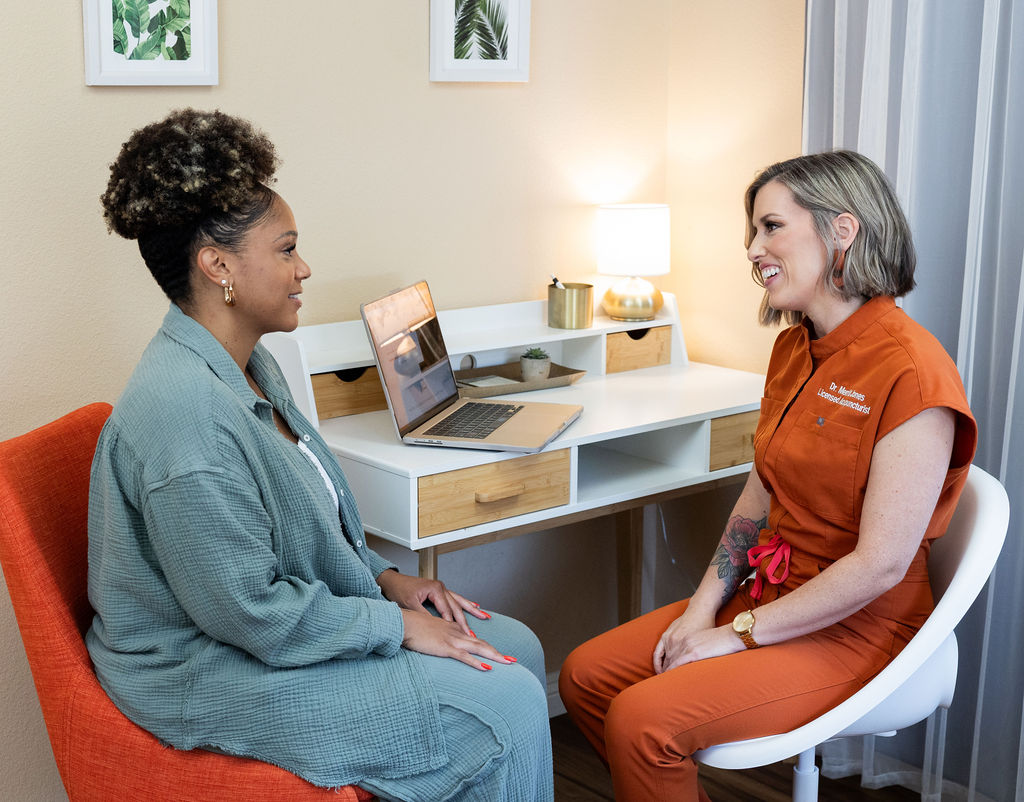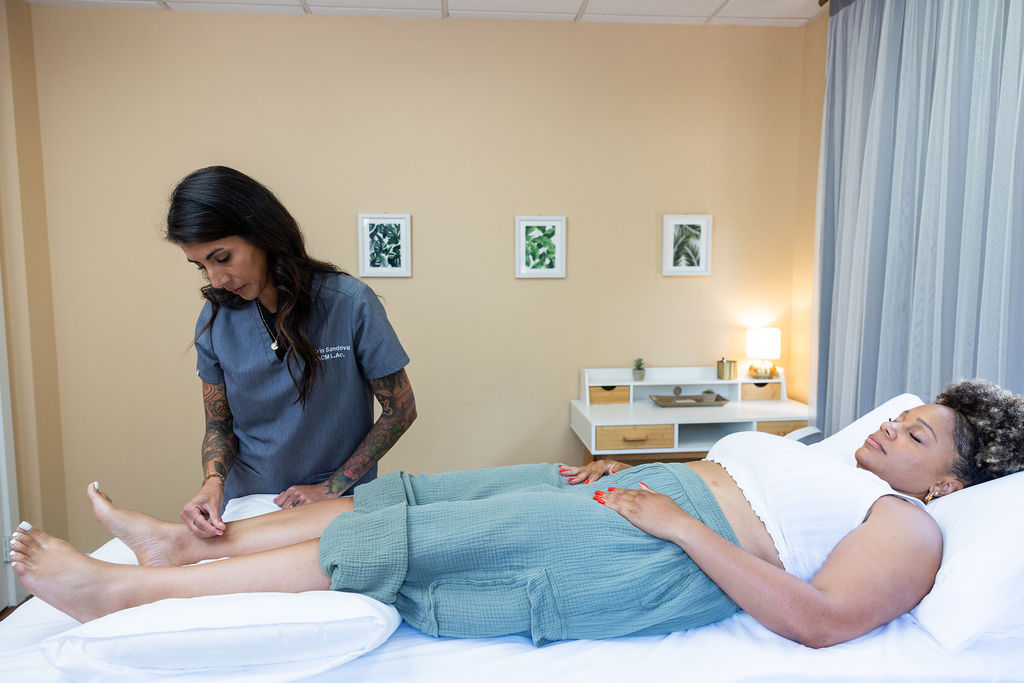Endometriosis
Integrative Endometriosis Support
Endometriosis is a chronic, inflammatory condition where tissue similar to the uterine lining grows outside the uterus, on the ovaries, fallopian tubes, bladder, bowels, and other areas where it doesn’t belong. It affects an estimated 1 in 10 people assigned female at birth and often takes 7–10 years or more to receive an accurate diagnosis.
While endometriosis is best known for causing painful periods and ovulation, it’s much more than just “bad cramps.” This is a complex, full-body disease that can impact the immune system, nervous system, digestion, pelvic floor, and even cardiovascular health. Symptoms vary widely and may include chronic pelvic pain, painful sex, bowel or bladder issues, fatigue, and infertility.
Your symptoms are real.
You deserve to be heard.
You deserve to live well and thrive.

“I have had a wonderful experience at NHRH from the start. Everyone is incredibly thoughtful and knowledgable with infertility struggles. I was diagnosed with endometriosis about a year ago. Dr. Merritt developed a nutritional/herbal plan that focused on reducing inflammation. We had a successful IUI after working with Dr. Merritt. I love the vibe at NHRH!”
Our Endometriosis Philosophy
Living with endometriosis can be complex, but it doesn’t mean you have to suffer. With the right tools and care, you can feel better, stronger, and more in control of your health. At Natural Harmony, we provide compassionate, evidence-based, and patient-centered care, because endo is too complex for a one-size-fits-all solution.
We take a team-based, “village” approach. That means working closely with San Diego’s top excision surgeons, pelvic floor physical therapists, reproductive endocrinologists, nutritionists and mental health providers to help you understand your diagnosis and build a treatment plan that supports your unique body, needs, and goals.
Our Integrative Approach to Endo
We believe that combining the best of conventional and holistic medicine offers the most sustainable path to relief and vitality for people with endometriosis.
For many, that means:
-
An anti-inflammatory, nutrient-dense diet
-
Acupuncture to support circulation and reduce inflammation
-
Strategic herbal and supplement plans
-
Gentle, pelvic-aware movement
-
Functional lab testing to uncover root imbalances
-
Expert excision surgery
- Collaboration with a qualified gynecologist and/or reproductive endocrinologist
We know, this can feel like a lot to navigate. That’s why we act as your partners in care, helping you identify what’s most effective and realistic for your life. You don’t have to do everything at once. You don’t have to do anything that doesn’t feel supportive. This is your journey—we’re just here to guide, collaborate, and cheer you on.
Each treatment plan we create is personalized and backed by research. We understand no two people experience endometriosis the same way, and while it’s a challenging condition, it doesn’t have to define your life. With the right tools and support, you can absolutely thrive.
“Dr. Erin is a literal angel sent from heaven! She has helped me immensely the last few months with my endo pain. Always a pleasure to come and see her!”

Natural Harmony Reproductive Health specializes in caring for people with endometriosis, recognizing that many people living with this disease have traveled a long and often challenging road. Our practice is dedicated to providing a safe space to come share your story, receive support to meet your unique needs, and heal.

Understanding Endometriosis
Despite how common it is, there’s still a frustrating gap in modern medicine’s understanding of endometriosis—and no single known cause. But research is finally gaining momentum, and after years of being dismissed, endo is starting to get the attention it deserves.
Here’s what we do know:
Endometriosis is a chronic, whole-body condition that’s likely multifactorial, shaped by a combination of genetics, immune function, gut health, and environmental exposures. It’s not just a reproductive issue; endo can influence (and be influenced by) many systems in the body, including:
-
Immune and inflammatory pathways
-
Circulatory and lymphatic health
-
Gut and microbiome balance
-
Hormonal regulation
-
Mental and emotional well-being
Emerging research continues to reveal just how interconnected these systems are—and why endometriosis care must be just as multidimensional.
Types and Stages of Endometriosis
There are three main types of endometriosis, categorized into four established stages (with a potential fifth stage still being debated by researchers). The stages are based on the location, depth, and severity of tissue growth, but they do not reliably predict how much pain or disruption a person may experience.
Types of endometriosis:
-
Superficial peritoneal endo (often Stage I or II): Thin, surface-level lesions on the pelvic lining.
-
Ovarian endometriomas (typically Stage III or IV): Also known as “chocolate cysts,” these are fluid-filled cysts that form in or on the ovaries.
-
Deep infiltrating endometriosis (DIE) (usually Stage III or IV): Dense, fibrotic lesions that grow deep into tissue and can impact organs such as the bladder, bowel, and uterosacral ligaments.
-
Diffuse or extra-pelvic endo (a proposed Stage V): Widespread endometriosis that affects multiple organs, sometimes found far from the reproductive system (e.g. diaphragm, lungs).
Pain Is Not a Reliable Indicator of Severity
One of the most misunderstood aspects of endometriosis is the disconnect between the amount of tissue growth and the level of pain or dysfunction someone experiences. For example, someone with Stage I endo may live with daily, life-altering pain, while another person with Stage IV endo might only discover it during fertility testing or imaging for unrelated issues.
This is why it’s so important to listen to patients—not just imaging or staging—and treat the whole person, not just the disease.
People living with endometriosis may experience:
- Chronic, severe pain
- Inflammation
- Fatigue
- Infertility
- Extreme bloating
- Digestive issues
- Frozen pelvis
- Hormonal swings
- Severe PMS
- Pain with penetration/intercourse and more
Endo + Chronic Inflammation
Endometriosis is widely recognized as an inflammatory disease. Research shows that many people with endo also experience changes in immune function. Natural killer (NK) cells, which normally help clear damaged tissue, may be less active. Other defense cells, like macrophages and T cells, don’t always work as they should.
At the same time, inflammatory signals such as cytokines and prostaglandins often run high. What’s still unclear is whether these immune shifts cause endo, or if the lesions themselves disrupt immune balance.
When inflammation persists, the body often responds by forming scar tissue. In endo, this scarring can build up over time, pulling on or blocking nearby organs. In advanced cases, it may even interfere with bowel, bladder, or reproductive function, sometimes requiring surgery to restore quality of life.
That’s why supporting immune health and reducing inflammation is such a key part of integrative endo care. By looking at a comprehensive personal history and family patterns, we can find ways to calm inflammation and help the body find a more sustainable balance.
Endo + Gut Health
Gut health is a cornerstone of endometriosis care, yet it’s often overlooked. Many people with endo know the feeling of “endo belly” – the painful bloating and discomfort that can make daily life tough. While not always, it often ties back to underlying gut imbalances.
Two patterns show up most often: dysbiosis, which is when the balance of good and bad bacteria is off (this can affect not only the gut but also the pelvis, vagina, and even the sinuses), and intestinal hyperpermeability, more commonly known as leaky gut. Research has found that people with endo may carry higher amounts of gram-negative bacteria like E. coli or Klebsiella, and some studies suggest these bacteria can even be present in the pelvic cavity itself.
Leaky gut is another key piece of the puzzle. Studies show it’s more common in those with endo, creating a cycle where a weakened gut lining drives inflammation, and inflammation worsens both gut and endo symptoms. Without support, that cycle is hard to break.
The hopeful news is that the gut can heal. When we restore balance and strengthen the gut lining, we create a healthier foundation – one that helps reduce inflammation and supports the body’s ability to better manage endometriosis.
Endo + Hormone Sensitivities
Endometriosis is considered an estrogen-sensitive disease. Even normal amounts of estrogen can fuel its growth, and a mix of genetics, environment, and lifestyle factors can all play a role. Common influences that make hormone metabolism more challenging include impaired immune or gut function, sluggish liver detox, nutrient-poor diets low in fiber, blood sugar swings, and high stress.
Estrogen isn’t the only hormone connection. Many people with endo also experience progesterone resistance, where the body’s progesterone receptors become less responsive. This resistance, often combined with chronic inflammation and estrogen dominance, may be a key reason why some patients face unexplained infertility.
Because hormone balance is just one piece of the larger endo puzzle, support needs to be comprehensive. Strategies that optimize liver detox, improve gut health, stabilize blood sugar, and strengthen nutrient intake all help create a more balanced hormonal environment – and a body that’s better able to manage endometriosis.
I must say that I went in skeptical. How can pins and needles help me with my pain? I suffer from Endometriosis and the usual aches and pains that come with getting older…
My first session with Dr. Merritt was a lot of talking about my medical background… she truly listened. It was wonderful!
Each session I go in with pain, and I walk out with none. It’s absolutely freakin’ mind-boggling!

